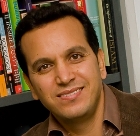The suicide protests |
The wave of global protests about the anti-Islam trailer ‘The Innocence of Muslims’ reflects the tensions, contradictions and polarizations of the world within which we live. Having watched this badly produced ‘clip’, it dawned on me that it does not warrant the terms ‘movie’, ‘trailer’, or ‘video’ as it simply does not amount to anything artistic or creative and should have been left to obscurity. But yes, for any Muslim who happened to see it, it is undoubtedly highly offensive, deliberately inflammatory, and visually disgusting. It intentionally seeks to portray Islam as a fraud and the prophet Muhammad as a sexual predator, pedophile and bloodthirsty megalomaniac of the worst possible kind. Yet this ‘clip’ does raise a few important questions regarding the concept of freedom of speech, the notion of censorship and the broader but related issue of intercultural understanding.
The first point to be made here relates to the offending act itself. Whilst we all uphold the fundamental right to freedom of speech and expression, and whilst this is a constitutional right in many countries, most notably the USA, one cannot help thinking there has to be a way of balancing this right with a notion of individual responsibility.
In other words, whilst individual citizens have the right to engage in speech and expression that may be offensive to others, somehow these same individuals need to realize that this right is not absolute and ought to be guided by a higher notion of public good and global ethics. Some would even suggest that there need to be clear legal boundaries preventing the spread of deliberately offensive materials that can have adverse outcomes for society at large. This is a delicate question but there are legal precedents for this kind of approach most notably defamation, slander and ‘Holocaust denial’, all of which are punishable by law in a number of countries. So in such situations, to simply hide behind the ‘freedom of speech’ mantra should no longer be an excuse for anyone from any faith or cultural background to deliberately engage in offending religious sentiments in a calculated and unrestrained manner.
Nevertheless it may also be counterproductive, and even fruitless, to drag such polarized debates to courts, and this is where the anti-legislative and anti-censorship argument becomes rather appealing. Perhaps, what can be pursued more vigorously instead is an engagement in promoting intercultural understanding, and a more positive and tolerant image of the other, in this case Islam. This should include a more systematic educational agenda with a view of engendering a more positive attitudinal change to cultural and religious diversity more generally. This more positive agenda will need to be pursued internationally, if it is to engender sustained positive attitudinal change.








 Fethi Mansouri Professor Mansouri is the Director of the Institute for Citizenship and Globalisation at Deakin University and Co-director of the Strategic Research Centre for Comparative Social Research.
Fethi Mansouri Professor Mansouri is the Director of the Institute for Citizenship and Globalisation at Deakin University and Co-director of the Strategic Research Centre for Comparative Social Research.
Post new comment